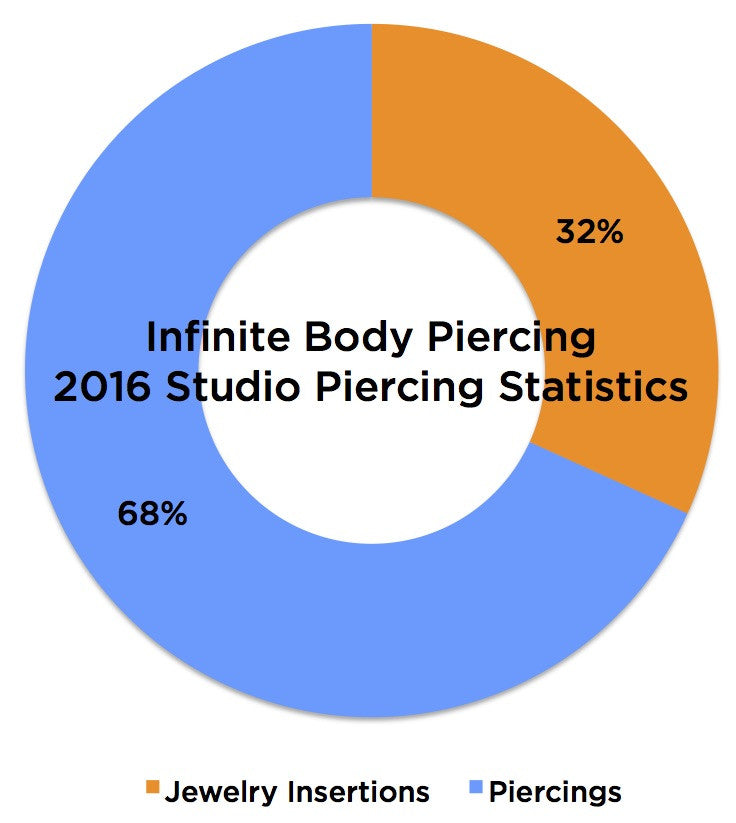
2016 Piercing Statistics
First, it’s important to note that new piercings aren’t the only service we offer; we change jewelry and stretch piercings for clients, free of charge, regardless of whether the original piercing was done at our studio. (Just tip your piercer!) It’s a continuing service for our returning customers, and a bit of outreach to customers we haven’t pierced—at least not yet. As a result, we did a whopping 4,062 jewelry insertions and piercings stretches in 2016. That’s 338.5 jewelry insertions per month, a little over 78 per week, and on average over 11 per day—and that’s in addition to clients we see for piercings. In 2016, 32% of our services were jewelry insertions, with piercings making up 68% of what we did last year.
2016 Total Piercings, by Type
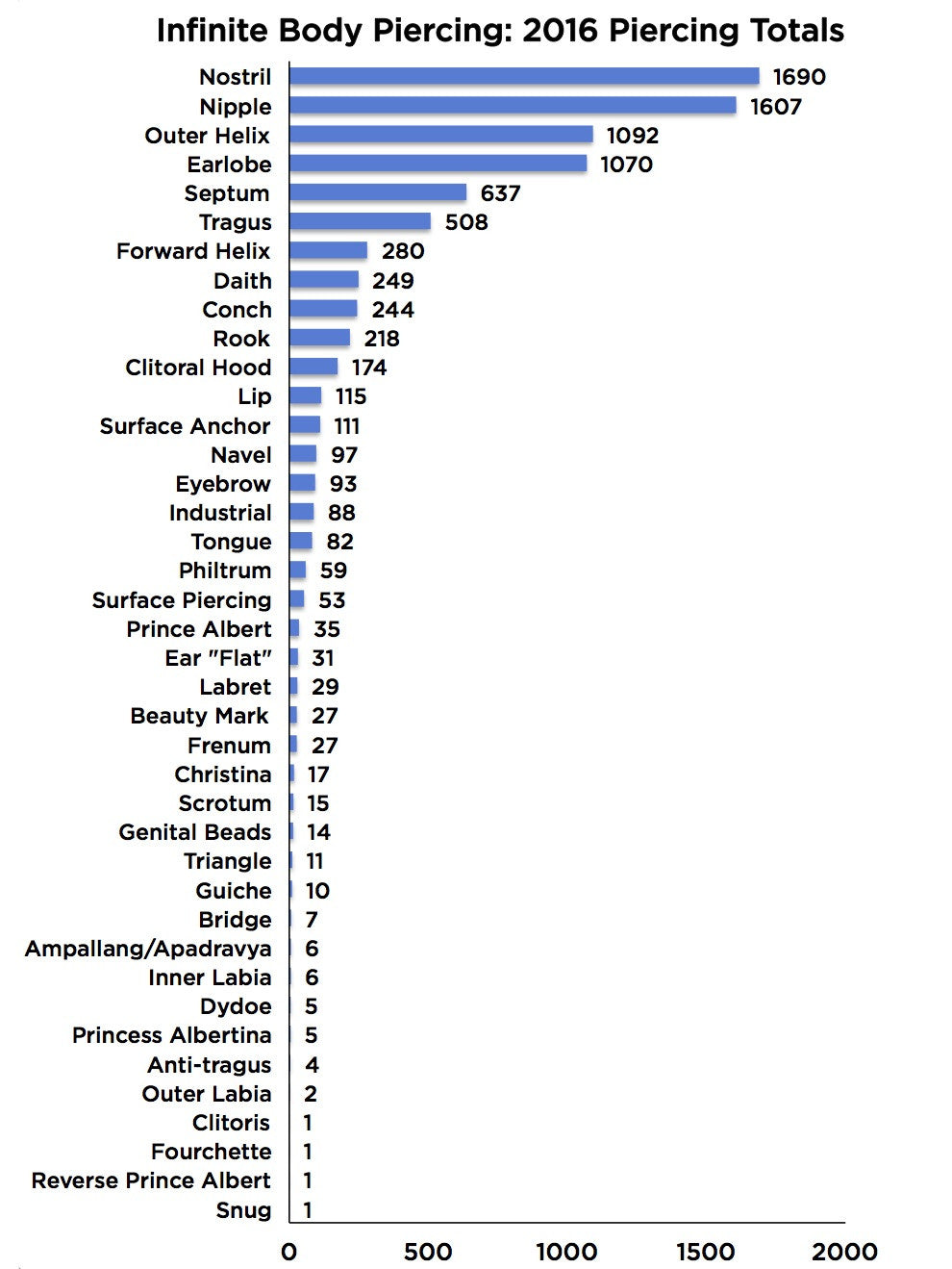
In total, the piercers here at Infinite did 8722 piercings in 2016. This works out to an average of 727 piercings per month, 168 per week, and 24 piercings per day. If you add in our 4,062 jewelry insertions and piercing stretches, that comes to an average of 1065 procedures per month, 246 each week, and 35 clients per day, every day. After jewelry insertions, the top five services we performed for clients were, in order: nostril piercings, nipple piercings, outer helix piercings, earlobe piercings, and then septum piercings. Repeating the results in 2015, nostril piercings were the most popular service we offered in 2016. We performed 1690 of them, just behind our 2015 number of 1697 nostril piercings. For the second year in a row, the nostril piercing is king—or queen, really, since the overwhelming majority of our nostril piercing clients are women.
Our second most popular piercing is the nipple. In all we did 333 single nipple piercings and 637 double nipple piercings—making for 1607 nipples pierced in 2016. Not surprisingly, in third and fourth place for most-requested piercings in 2016 were outer helix piercings and earlobe piercings, with 1092 and 1070 performed respectively. Rounding out the top five was septum piercings, with 637 done in 2016. You can see a breakdown of everything we did in 2016, below.
Two piercings absent from this year’s list that were on last year’s are tongue webbing piercings (we did eleven in 2015) and cheek piercings (we did four that year). This could be because people didn’t request them, or the piercing staff talked clients out of them. (They are both problematic piercings: the tongue webbing for keeping it from migrating; and cheek piercings for getting them to heal.) Or maybe it’s a little bit of both.
Ear Piercing Numbers
It’s no surprise that a lot of what we do are different ear piercings. The breakdown of ear piercings done in 2016 is noted in these images.
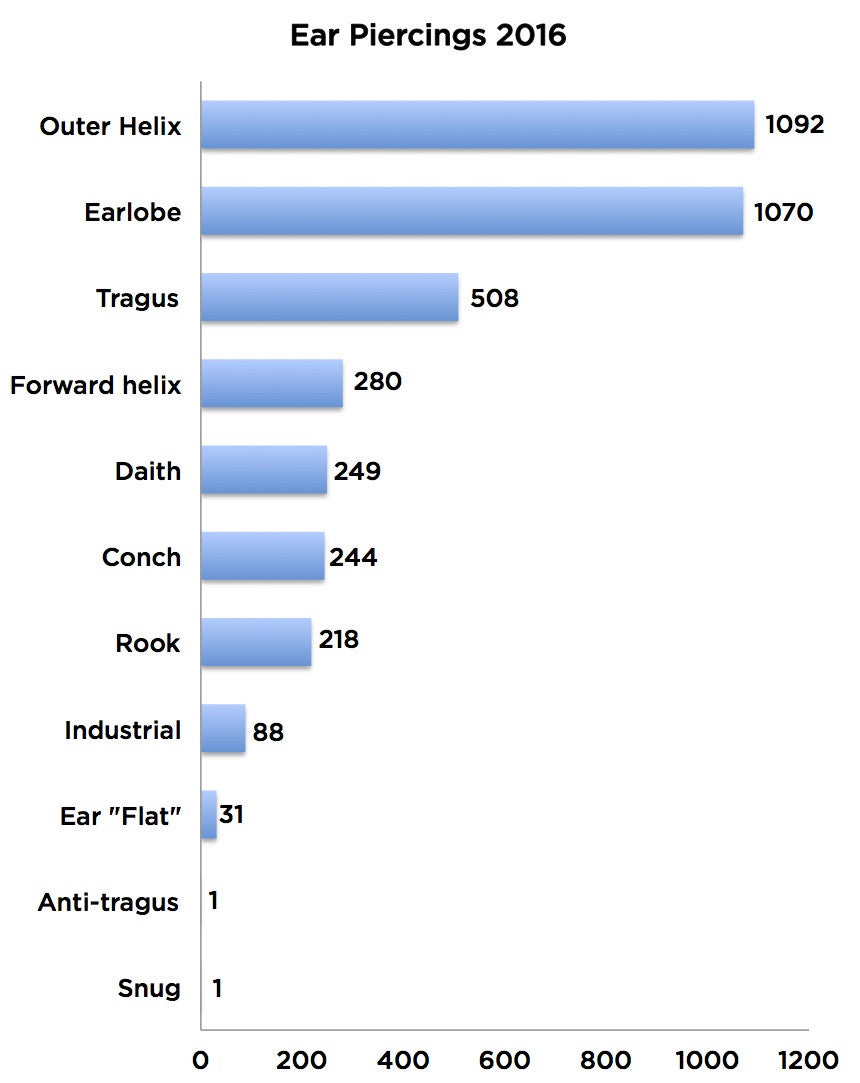
We did 3,785 ear piercings in 2016. This works out to over 315 ear piercings per month, almost 73 per week, and an average of 10.3 ear piercings every day. These accounted for approximately 44.4% of total piercings.
Facial and Oral Piercings
We performed 2427 different non-ear facial piercings in 2016, including nostril, septum, eyebrow, and bridge piercings, and 312 oral piercings, including lip, labret, beauty mark, philtrum, and tongue piercings. Facial piercings accounted for approximately 28% of total piercings, while oral piercings accounted for under 4%.
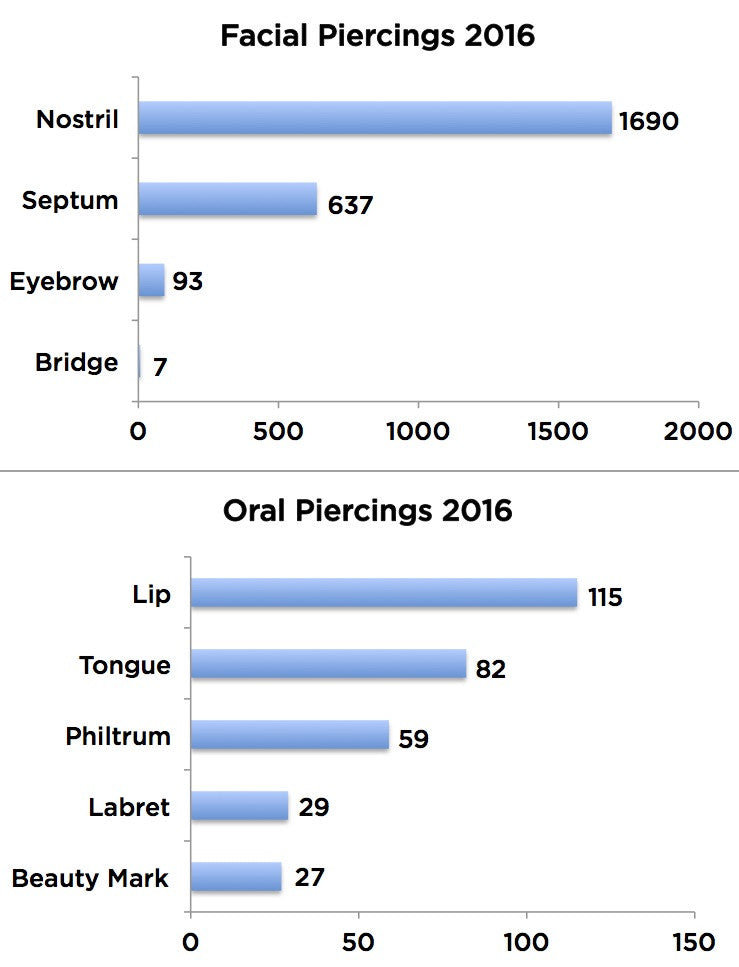
Genital Piercing Numbers
Lastly, we performed 330 genital piercings in 2016: 217 female genital piercings, and 113 male genital piercings. Measured against our total numbers, genital piercings account for just under 4% of our total piercings. The most popular female genital piercing, by a large margin, was the clitoral hood piercing—it was number eleven on the overall list of most popular piercings—with a surprising five Princess Albertina piercings done last year. The most popular male genital piercing was the Prince Albert piercing, followed closely behind by the frenum piercing. Robert and Ed also inserted fourteen genital beads on nine different clients.
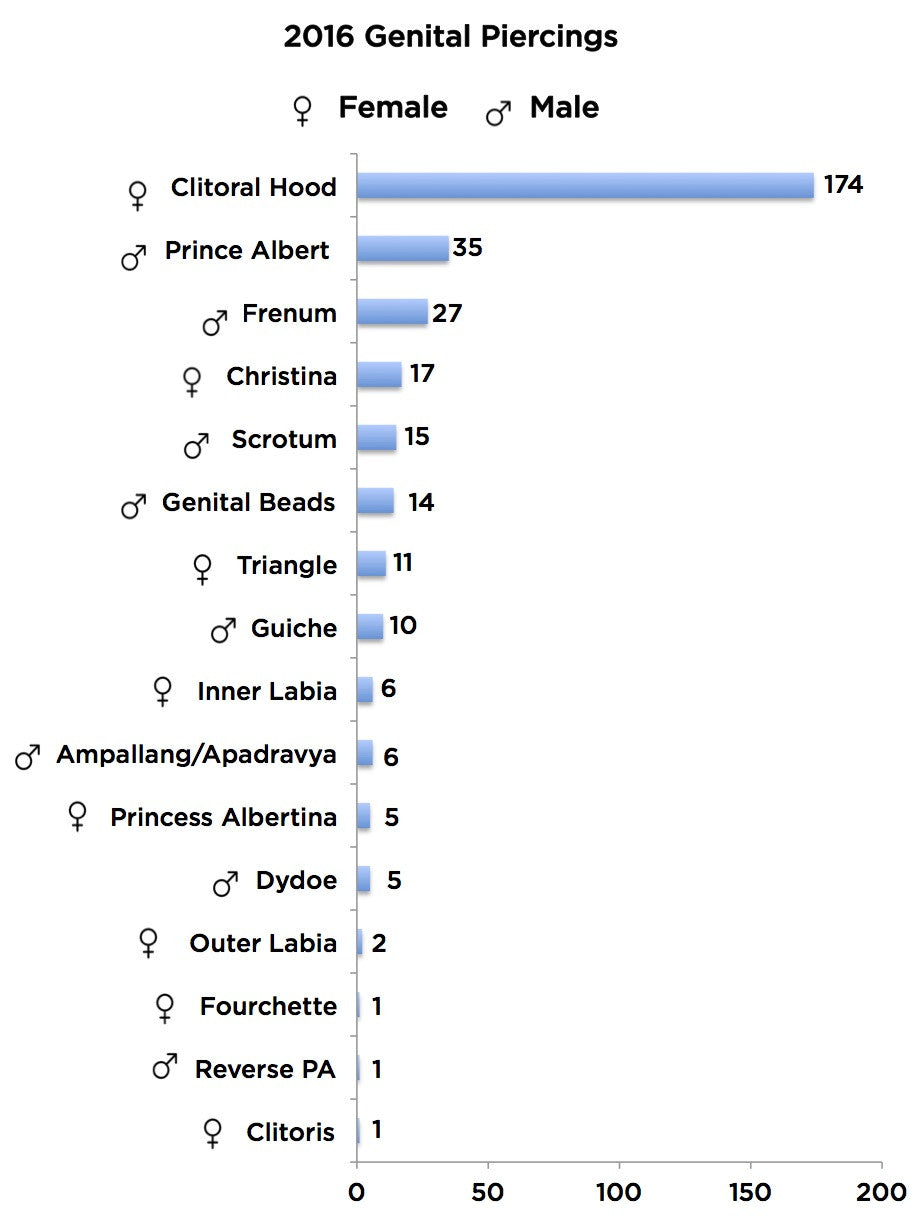
Piercing Totals by Category and Piercer
How does this break down by category? Facial piercings account for 28% of what we did last year, oral piercings 4%, ear piercings a whopping 44%, nipple piercings 19%, genital piercings 4%, and navel piercings a small 1% of our totals.
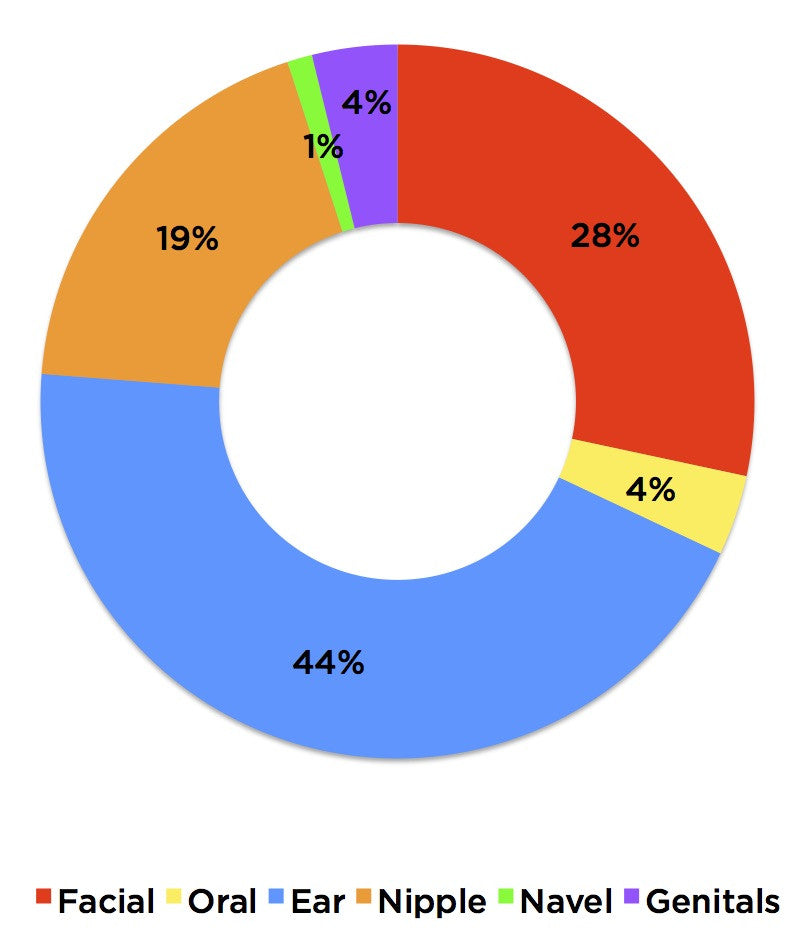
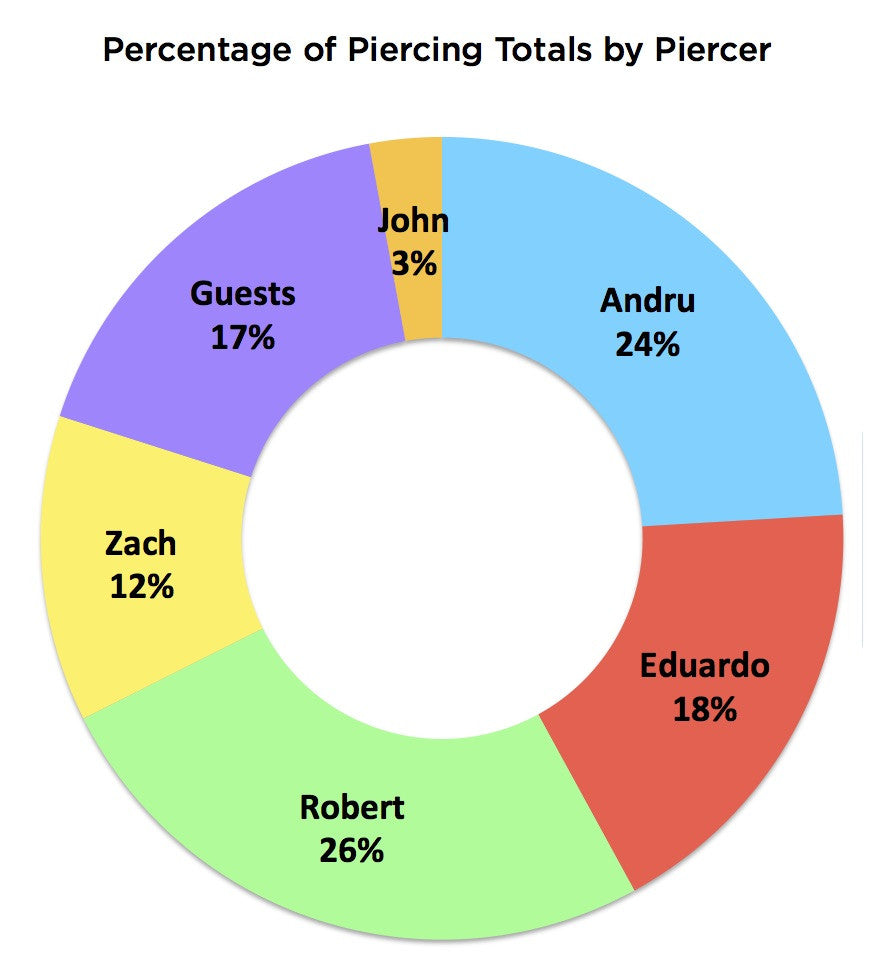
We have four piercers on staff—with two scheduled together on weekdays and all four scheduled and rotating through weekend shifts—with various guest piercers helping us out during any staff transitions and/or during extended vacation times with our regular staff. If we track the piercing totals by piercer, you get a breakdown of the percentage of piercings performed by each member of our piercing staff. Robert and Andru both saw a quarter of last year’s clients, with Eduardo seeing slightly less. (As head piercer at the studio, Ed’s responsibilities often mean some of the other piercers are seeing clients while Ed is taking care of other pressing matters at the studio.) We had a few months at the beginning of the year, between the departure of John Logger and the hiring of Zach, when we had quite a few guests seeing clients at the studio. You can see the breakdown with the accompanying chart.
Our Clients, by Gender
Lastly, who are the people coming in for our services? Unfortunately, we don’t have detailed demographic data on our clients, such as age or location. We can pore over release forms for much of this information, but that is prohibitively time-consuming. What we have done, though, is go through last December’s clients’ forms to determine the gender breakdown of our customers. While it’s obvious more women than men come in for our services, it was surprising to find out just how big the discrepancy is. An overwhelming percentage of our clients are women, in reality just under 90%, while a little over 10% of our piercing clients are men. This also includes our numerous trans clients. (This is why we refer to “female” or “male” genital piercings, but break down our clients between “men” and “women.”) We also have quite a few clients who identify outside of the gender binary, but at this time their numbers are few when compared to the total client numbers.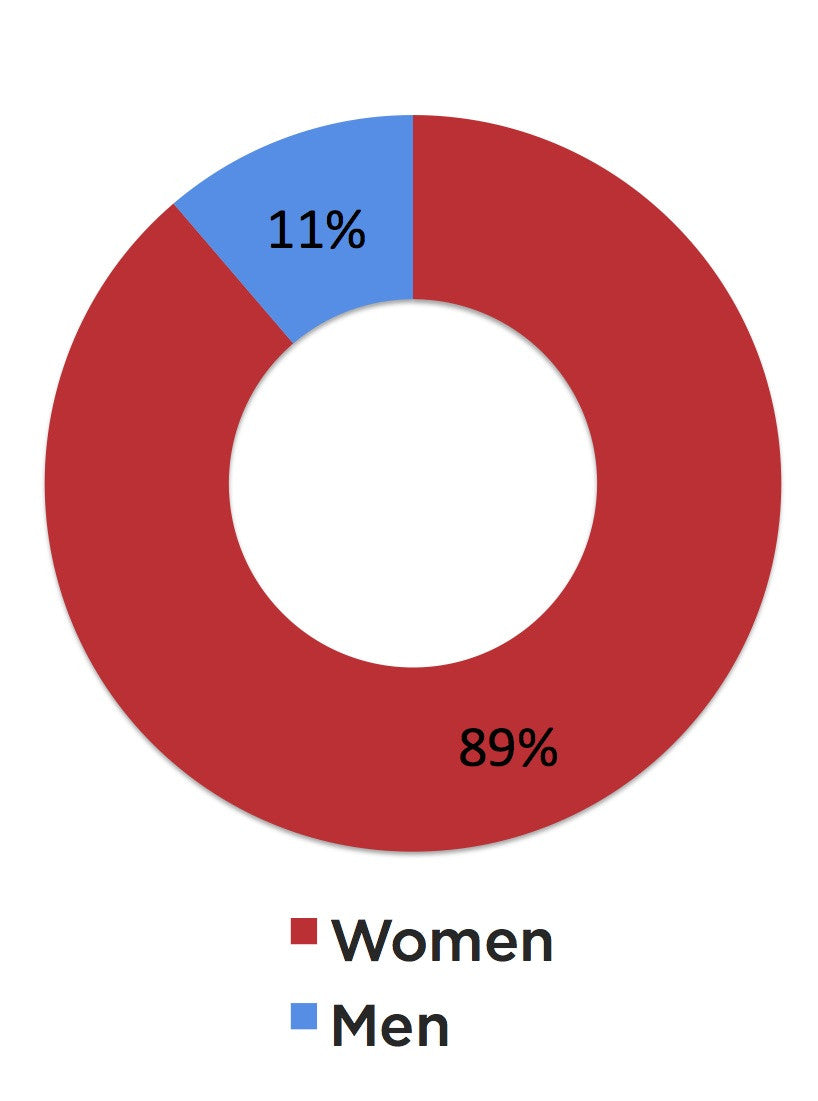
In contrast to our lack of more detailed information on our clients, Facebook has excellent (insidious?) tools for demographics. Through our page analytics, we’re able to get an age breakdown of our Facebook fans: 50% are aged 25-34; 22% are aged 18-24; 17% aged 35-44; 8% are over 45 years old, with less than 3% under 18 years old. Unfortunately, this most likely says more about Facebook’s audience than ours.
Whew! Congratulations if you’ve made it this far. Statistics can be either fascinating or tedious, and we hope we’ve presented these in enough of an engaging way that everyone can geek out on these numbers as much as we did.
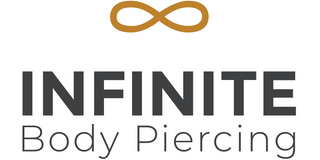
Leave a comment